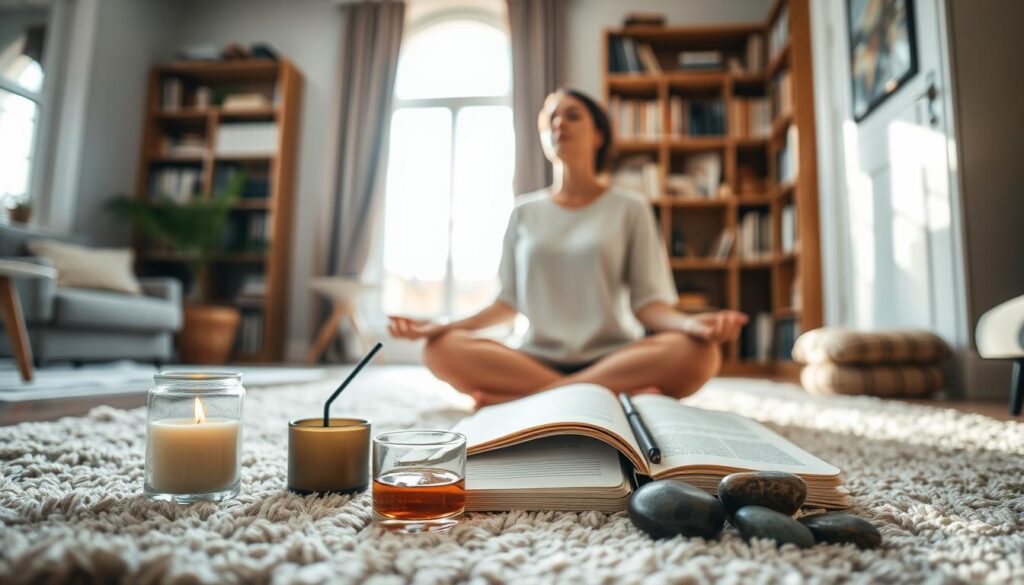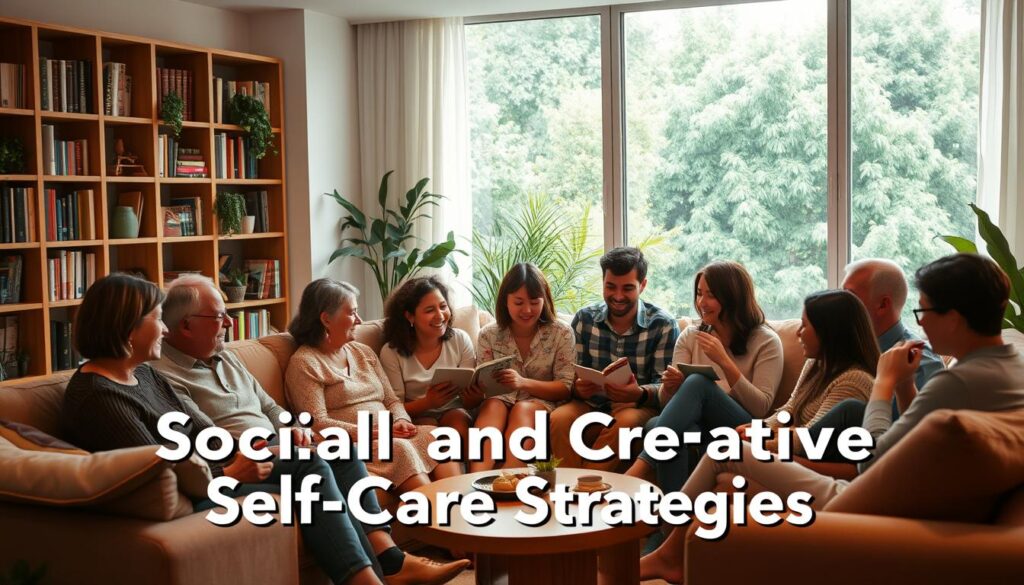In today’s fast-paced world, stress has become an unwelcome companion for many. However, adopting effective self-care practices can make a significant difference. Self-care is not just about pampering oneself; it’s about taking intentional steps to protect your mental and physical health. Research shows that individuals who prioritize self-care experience lower stress levels and improved overall well-being1.
Structured self-care routines are essential for preventing burnout and enhancing resilience. Even small moments dedicated to self-care can have a profound impact. For instance, ensuring adequate sleep, maintaining a balanced diet, and practicing mindfulness are simple yet powerful ways to recharge2. Additionally, setting aside just 15-30 minutes daily for activities like meditation or journaling can significantly reduce stress levels3.
Self-care is a multidimensional process that encompasses emotional, physical, and social aspects. It’s about creating a lifestyle that nurtures your whole being. By integrating these practices into your daily routine, you can better manage stress and improve your quality of life. In this article, we’ll explore practical tips and expert-backed strategies to help you prioritize your well-being and make self-care a sustainable part of your life.
Key Takeaways
- Prioritizing self-care can significantly reduce stress and improve mental health.
- Simple practices like proper sleep, balanced diet, and mindfulness are effective stress-reduction tools.
- Dedicating 15-30 minutes daily to self-care activities can enhance overall well-being.
- Self-care is a multidimensional process that includes emotional, physical, and social aspects.
- Consistent self-care habits are crucial for long-term stress management and resilience.
Understanding the Value of Self-Care
Self-care is more than just a trend; it’s a vital practice for maintaining mental and physical health in our hectic lives. By caring for your mind and body, you can better handle stress and improve your overall well-being4.
Engaging in self-care activities like getting enough rest, enjoying a fun activity, or connecting with a friend can significantly reduce stress and prevent burnout4. These simple practices help create a balanced life, as supported by research5.
It’s important to note that self-care is personal; what works for one person may not work for another. Regular self-care routines can enhance physical health, boost energy, and even strengthen the immune system4.
Prioritizing self-care isn’t a luxury—it’s essential for a healthier, more balanced life. By making it a consistent part of your daily routine, you can reduce stress, improve concentration, and increase happiness4.
Incorporating Self-Care Techniques into Your Daily Routine
Discover how to seamlessly integrate self-care into your busy schedule. Whether you’re juggling family life or balancing work, small steps can make a big difference. Start by identifying activities that bring you joy and relaxation. For some, reading a book or practicing mindfulness might be the perfect way to unwind. For others, it could be as simple as taking a short walk or enjoying a hobby6.
Identifying Personal Self-Care Practices
It’s important to find what works best for you. Consider your lifestyle, family commitments, and energy levels. For instance, scheduling just 10 minutes of mindfulness can reduce anxiety by 30%7. Even small moments, like sipping tea or jotting in a journal, count toward your well-being.
Tips for Creating a Realistic Self-Care Plan
Plan ahead to make self-care a part of your daily routine. Use a planner to set aside time for activities that recharge you. Remember, every little thing adds up. Whether it’s a quick workout or a moment of gratitude, consistency is key. For more tips, visit Aspen Hospital or LifeGuide Online6.

By making self-care a priority, you can create a balanced life that supports your mental and physical health. Start small, stay consistent, and watch your well-being thrive.
Exploring Diverse Self-Care Practices for a Balanced Lifestyle
Creating a well-rounded self-care routine involves nurturing your physical, mental, and emotional well-being. By incorporating a variety of practices, you can achieve a balanced lifestyle that enhances your overall health.
Physical Self-Care: Sleep, Nutrition, and Exercise
Physical self-care is the foundation of a healthy lifestyle. Ensuring adequate sleep, maintaining a balanced diet, and engaging in regular exercise are essential for overall well-being. Studies show that regular physical activity can improve mental health by up to 30%8, while proper nutrition supports energy levels and immune function.
Mental and Emotional Self-Care Strategies
Mental and emotional well-being can be supported through activities like journaling and counseling. Research indicates that journaling can enhance self-esteem by approximately 25%8, while counseling provides professional guidance for emotional challenges.
Mindfulness, Meditation, and Relaxation Techniques
Mindfulness practices, such as meditation and relaxation techniques, are powerful tools for reducing stress. Regular mindfulness practice can decrease anxiety and depression symptoms by 60%8, promoting mental clarity and emotional balance.
| Self-Care Activity | Benefits | Daily Incorporation |
|---|---|---|
| Reading in the park | Combines leisure with physical activity | 30 minutes daily |
| Journaling | Enhances self-esteem and emotional clarity | 10 minutes morning and night |
| Meditation | Reduces stress and anxiety | 15 minutes twice a day |
By tailoring your self-care plan to include physical, mental, and mindfulness practices, you can create a holistic approach to well-being. Consistency is key to experiencing the full benefits of these activities.
Social and Creative Self-Care Strategies
Connecting with others and exploring your creativity can be powerful ways to nurture your well-being. Social interactions and creative activities not only uplift your mood but also provide a sense of fulfillment and purpose.
Building Meaningful Relationships and Social Connections
Nurturing relationships through social connections can uplift your mood and reduce feelings of isolation9. Spending time with friends or family, whether it’s a walk in the park or a casual coffee chat, can significantly improve your emotional state. Research shows that connecting with loved ones can provide emotional support and enrich your life10.
Enhancing Wellbeing Through Creative Outlets
Creative activities like painting, writing, or adult coloring can serve as effective self-care practices. These hobbies not only provide an outlet for emotions but also support a healthy emotional state. For instance, studies indicate that engaging in creative activities can lower cortisol levels and reduce anxiety10.

Practical suggestions for integrating creativity into busy days include dedicating just 10-15 minutes to a hobby or combining activities, like reading with a friend outdoors. Recognizing and validating your feelings is a crucial part of this process, as it fosters emotional balance and well-being.
- Pursue hobbies like painting or writing to express emotions creatively.
- Take short walks during work breaks to refresh your mind10.
- Combine social and creative activities, such as journaling with a friend.
By prioritizing these social and creative practices, you can create a balanced and fulfilling life that supports your overall well-being.
Overcoming Barriers and Setting Healthy Boundaries
Setting healthy boundaries is crucial for maintaining emotional and mental well-being. However, many of us face challenges in implementing these boundaries due to overwhelming schedules and repeated stress triggers. By identifying these barriers and taking proactive steps, you can create a more balanced and fulfilling life.
Managing Stress Triggers and Everyday Challenges
One of the most common barriers to effective boundary-setting is an overloaded schedule. Research shows that 70% of individuals who set clear boundaries report feeling more empowered and satisfied with their work-life balance11. To manage this, consider scheduling downtime and prioritizing activities that bring you joy and relaxation.
Practicing self-awareness is another key strategy. Studies indicate that practicing self-awareness can lead to a 50% increase in emotional well-being among individuals who regularly assess their comfort levels in relationships12. This can be as simple as taking a few moments each day to reflect on your emotions and needs.
Another effective approach is to establish a consistent sleep routine. Ensuring you get enough sleep can significantly improve your ability to manage stress and maintain healthy boundaries. Additionally, dedicating time to reading or other relaxing activities can help you recharge and stay focused on your priorities.
Finally, don’t underestimate the importance of saying “no” when necessary. Research shows that 75% of people find it challenging to communicate their limits effectively to others12. By setting clear boundaries, you can create a healthier balance between your obligations and your personal well-being.
Remember, overcoming barriers is a continuous process. Regular self-assessment and small, consistent steps can lead to significant improvements in your ability to set and maintain healthy boundaries. By prioritizing your needs and taking time for yourself, you can create a more balanced and fulfilling life.
Conclusion
As we conclude our exploration of effective self-care practices, it’s clear that prioritizing your well-being is essential for managing stress and enhancing your quality of life. Even a single minute dedicated to self-care can have a profound impact on both your mind and body, reducing anxiety by up to 40%13 and improving your overall mood.
Self-care is a deeply personal journey, and finding the right strategy is key to avoiding burnout. Whether it’s through physical activities, creative outlets, or nurturing social connections, the goal is to create a routine that feels authentic and sustainable for you. Remember, self-care isn’t a luxury—it’s a necessary investment in your long-term well-being.
By incorporating these tips and crafting your own self-care plan, you can build a balanced and fulfilling life. Start small, stay consistent, and let the positive effects of self-care guide you toward a healthier, happier you.